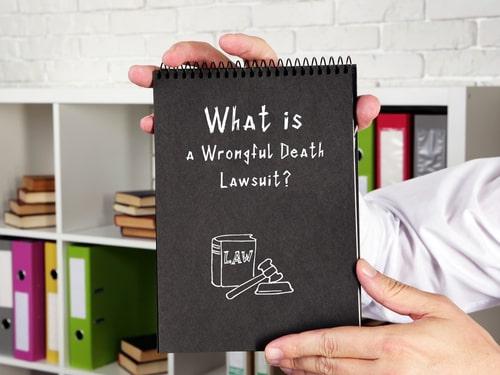Free Consultations 512-474-2222
512-474-2222
Contact Our Firm
The use of the Internet or this form for communication with the firm or any individual member of the firm does not establish an attorney-client relationship. Confidential or time-sensitive information should not be sent through this form.
I have read and understand the Disclaimer and Privacy Policy.

Recent Blog Posts
Wrongful Death Lawsuit: Financial Justice for Your Loved One’s Death
 There are many accidents that are caused by another party’s negligence where the victim does not survive their injuries. In these tragic circumstances, the victim’s survivors can pursue legal action against that party or parties who are responsible for the death. A wrongful death lawsuit can be critical in helping secure financial stability for the victim’s family.
There are many accidents that are caused by another party’s negligence where the victim does not survive their injuries. In these tragic circumstances, the victim’s survivors can pursue legal action against that party or parties who are responsible for the death. A wrongful death lawsuit can be critical in helping secure financial stability for the victim’s family.
What Is a Wrongful Death Lawsuit?
Wrongful death lawsuits allow survivors of victims who die as a result of the negligence or wrongdoing of another person to recover monetary damages from the person legally liable for the death. Under the Texas Wrongful Death Act, the law says that if a victim is killed due to another party’s wrongful act, negligence, or any other act that breaches a party’s duty to exercise reasonable care, that party can be held financially liable.
Under the law, a wrongful death lawsuit can only be filed by surviving spouse, the children, and the parents of the victim. A lawsuit can also be filed by a representative for the victim’s estate.
The Seriousness of Reckless Driving Charges in Texas
 When a person engages in driving behaviors that can be classified under the law as reckless, they put themselves and everyone else around them in danger. Because of the seriousness of these actions, a charge of reckless driving is not considered a traffic violation in Texas, but is instead classified as a misdemeanor criminal offense. Anyone accused of reckless driving is arrested and must go through the criminal court system where they will be found either guilty or not guilty in order for the case to come to a resolution. This is why it is important to have a Travis County defense attorney advocating for you.
When a person engages in driving behaviors that can be classified under the law as reckless, they put themselves and everyone else around them in danger. Because of the seriousness of these actions, a charge of reckless driving is not considered a traffic violation in Texas, but is instead classified as a misdemeanor criminal offense. Anyone accused of reckless driving is arrested and must go through the criminal court system where they will be found either guilty or not guilty in order for the case to come to a resolution. This is why it is important to have a Travis County defense attorney advocating for you.
What Driving Behaviors Can Result in a Reckless Driving Charges?
Under Texas law, a person is guilty of reckless driving if they drive their vehicle, “in willful or wanton disregard for the safety of persons or property.” There are multiple driving behaviors which can result in a driver getting arrested and charged with reckless driving. Any driving behavior that puts others at risk of injury or death can be classified as reckless driving. There are some behaviors that are more common than others, including:
Arrest Warrants in Texas
 When an individual learns that an arrest warrant has been issued against them, the person may be sent into a panic. They may envision being pulled over for minor infractions and being taken to jail after the warrant is discovered, or having the police show up at their home or place of employment. While these scenarios do occur, the fact is that the actions law enforcement takes will likely depend on your specific criminal charges and the circumstances surrounding your case. However, an arrest warrant is nothing to take lightly and is something you should consult with an experienced criminal defense attorney on right away to ensure your rights and best interests are protected.
When an individual learns that an arrest warrant has been issued against them, the person may be sent into a panic. They may envision being pulled over for minor infractions and being taken to jail after the warrant is discovered, or having the police show up at their home or place of employment. While these scenarios do occur, the fact is that the actions law enforcement takes will likely depend on your specific criminal charges and the circumstances surrounding your case. However, an arrest warrant is nothing to take lightly and is something you should consult with an experienced criminal defense attorney on right away to ensure your rights and best interests are protected.
Arrest Warrants in Texas
An arrest warrant can be issued whenever the law is broken, whether it involves a charge of theft, a white-collar crime such as fraud or embezzlement, or more serious and violent criminal offenses. Under Texas law, a law enforcement official can arrest you at the scene immediately if they see a crime has been committed, or they can request an arrest warrant from the court based on the evidence in your case.
What to Do if You Are Accused of a Sexual Offense
 Of all the criminal charges in the Texas criminal justice system, sex crimes are among the most serious. In addition to eliciting a strong response from the general public, these charges are likely to have a significant impact on your career and as well as your personal relationships. Being charged with a sexual offense can also jeopardize your parental rights. In these situations, it is important to take the steps necessary to protect yourself. The following steps can be critical to the final outcome of your case.
Of all the criminal charges in the Texas criminal justice system, sex crimes are among the most serious. In addition to eliciting a strong response from the general public, these charges are likely to have a significant impact on your career and as well as your personal relationships. Being charged with a sexual offense can also jeopardize your parental rights. In these situations, it is important to take the steps necessary to protect yourself. The following steps can be critical to the final outcome of your case.
Steps to Take when Facing Sex Crime Charges
There are a variety of different types of sex crimes listed under the Texas criminal law statutes. These can range from stalking and sexual harassment, to engaging in illicit and illegal conduct online, all the way up to charges of rape and sexual assault. In any of these situations, it is important to take the following steps to protect yourself:
Steps to Take Following a DWI Arrest
 When a driver is arrested for DWI, it is understandably a very stressful–and sometimes frightening–experience, especially if it is their first time ever being arrested. Not only are your driving privileges at stake, but a DWI conviction can also have an impact on other areas of your life, as well. The steps you take immediately following your arrest can help improve the outcome of your case. The following recommendations are a brief overview of how you should proceed. A DWI defense attorney from our firm can provide you with more detailed information about your situation if you have been charged.
When a driver is arrested for DWI, it is understandably a very stressful–and sometimes frightening–experience, especially if it is their first time ever being arrested. Not only are your driving privileges at stake, but a DWI conviction can also have an impact on other areas of your life, as well. The steps you take immediately following your arrest can help improve the outcome of your case. The following recommendations are a brief overview of how you should proceed. A DWI defense attorney from our firm can provide you with more detailed information about your situation if you have been charged.
How You Can Help Your Attorney
After you are arrested for drunk driving, you will likely be released from jail while you await trial. There are likely stipulations that the court issued that are contingent with you remaining free until your case is resolved and it is critical that you follow those stipulations.
Defending Against Drug Possession Charges in Texas
 Being charged with a drug crime is a serious matter in any state, but penalties if convicted in Texas are especially harsh. Even a conviction for drug possession can result in a jail sentence, depending on the circumstances of the case. However, a prosecutor’s case is only as strong as the evidence he or she is able to present to a jury and if that evidence is weak or tainted, a defense attorney may be able to convince the court that it is inadmissible.
Being charged with a drug crime is a serious matter in any state, but penalties if convicted in Texas are especially harsh. Even a conviction for drug possession can result in a jail sentence, depending on the circumstances of the case. However, a prosecutor’s case is only as strong as the evidence he or she is able to present to a jury and if that evidence is weak or tainted, a defense attorney may be able to convince the court that it is inadmissible.
Drug Possession in Texas
Under Texas law, there are four classes of drugs. Marijuana has a separate class of its own. Each class has its own set of penalties that the court can impose if a person is found guilty of drug possession.
Depending on the type and amount of the drug a person is accused of possessing, the charges can range from a Class B or Class C misdemeanor (with conviction carrying a penalty of up to one year in jail and/or a fine of up to $4,000), third-degree felony, up to a first-degree felony. The harshest penalty a person convicted of drug possession can receive is 99 years to life in prison and/or a fine of up to $250,000.
‘Tis the Season for Increased Risk of Car Accident Injuries
 December has arrived, and along with it comes the hustle and bustle of the holiday season. Unfortunately, so many people are so focused on getting ready and celebrating the holidays that they sometimes overlook safe driving behaviors, putting themselves and everyone around them at risk of car accident injuries. Although there are many reasons why car accidents occur, this time of the year often sees an increase in aggressive driving accidents and alcohol-related crashes.
December has arrived, and along with it comes the hustle and bustle of the holiday season. Unfortunately, so many people are so focused on getting ready and celebrating the holidays that they sometimes overlook safe driving behaviors, putting themselves and everyone around them at risk of car accident injuries. Although there are many reasons why car accidents occur, this time of the year often sees an increase in aggressive driving accidents and alcohol-related crashes.
Aggressive Driving
If you find yourself wondering if drivers are just more impatient and aggressive this time of year, rest assured it is not your imagination. They are. Road rage and aggressive driving increases during the holiday season. In one study, researchers looked at data that was collected from 10 major cities during the Thanksgiving holiday weekend to determine how much aggressive events on the road increase during holidays. Aggressive events included acts of speeding, rapid acceleration, and hard braking. The study found that the number of these events spiked an alarming 20 percent more on a holiday weekend compared to other times of the year. At the very minimum, these aggressive acts result in a 40 percent increase in more fuel used. At the worst, these acts result in the deaths and injuries of thousands of victims each year.
Avoiding a DWI During Thanksgiving Weekend
 Thanksgiving is usually the kickoff for the winter holiday season. Historically, the day before Thanksgiving is known as one of the busiest travel days of the year as travelers take to the roads and the sky to visit family and friends near and far. It is estimated that more than 40 million people take to the roads for the Thanksgiving holiday.
Thanksgiving is usually the kickoff for the winter holiday season. Historically, the day before Thanksgiving is known as one of the busiest travel days of the year as travelers take to the roads and the sky to visit family and friends near and far. It is estimated that more than 40 million people take to the roads for the Thanksgiving holiday.
Because so many people travel “home” for the holiday, the long Thanksgiving weekend is also a time when many friends get together at local pubs and restaurants, celebrating with mini reunions. It is not uncommon at any of these gatherings for there to be alcohol served. Unfortunately, getting behind the wheel of a vehicle after drinking can quickly “squash” your Thanksgiving weekend plans and leave you facing serious drunk driving charges.
Thanksgiving Alcohol Data
According to national statistics, the night before Thanksgiving is one of the biggest drinking nights of the year. The beer sales in bars throughout the country spikes more than 270 percent, while the sales of hard liquor increases by almost 115 percent. The tremendous increase in the number of patrons out drinking has led to the day before the holiday to be dubbed “Blackout Wednesday” referencing the “blacking out” many people experience due to excessive drunkenness.
DOJ Investigating Five Texas Juvenile Facilities Over Horrific Allegations
 Under the Texas criminal justice system, when a minor has committed criminal offenses, jurisdiction falls under Texas Juvenile Justice Department (TJJD). The goal of the TJJD is to protect both the child’s interest and keep communities safe. Although the hope is to keep the child from being sent to a juvenile detention facility, there are many cases where the TJJD judge does sentence a juvenile offender to a detention facility.
Under the Texas criminal justice system, when a minor has committed criminal offenses, jurisdiction falls under Texas Juvenile Justice Department (TJJD). The goal of the TJJD is to protect both the child’s interest and keep communities safe. Although the hope is to keep the child from being sent to a juvenile detention facility, there are many cases where the TJJD judge does sentence a juvenile offender to a detention facility.
Recently, the U.S. Justice Department (DOJ) announced that it is initiating an investigation into five facilities over allegations of physical violence, sexual abuse, and other mistreatment of minors being held at these locations.
Investigation Launched
According to the statement issued by the DOJ, the allegations came to the department’s attention through new reports, public documents, and social media posts. There was also information that came from people who work in the Texas prison systems relaying accounts of neglect of mentally ill detainees, sexual abuse, and horrific physical violence.
Solicitation of a Prostitute Now a State Felony Charge in Texas
 A new law that went into effect last month in Texas significantly increases the charges that a person faces if they are arrested and charged with solicitation of a prostitute. That crime will now be charged as a state jail felony and the penalties for a conviction means a prison sentence and steep fines.
A new law that went into effect last month in Texas significantly increases the charges that a person faces if they are arrested and charged with solicitation of a prostitute. That crime will now be charged as a state jail felony and the penalties for a conviction means a prison sentence and steep fines.
TX HB1540
For decades, the penalties for anyone arrested and convicted for prostitution were much more severe than for those charged with being a client. The person charged with prostitution was looked at as the criminal and could face jail time, while the client was usually only given a ticket, if anything at all.
However, over the past several years, law enforcement, lawmakers, and the public have come to believe that many people who engage in prostitution are not doing so willingly. Some may be victims of human trafficking who have been forced into prostitution. According to one major study, there are approximately 313,000 victims of human trafficking at any given moment in the state of Texas.




